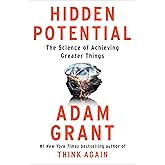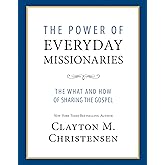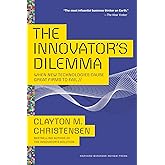Buy new:
-53% $13.98$13.98
FREE delivery January 13 - 17
Ships from: Kuleli Books Sold by: Kuleli Books
Save with Used - Acceptable
$8.12$8.12
Ships from: Amazon Sold by: Jenson Books Inc

Download the free Kindle app and start reading Kindle books instantly on your smartphone, tablet, or computer - no Kindle device required.
Read instantly on your browser with Kindle for Web.
Using your mobile phone camera - scan the code below and download the Kindle app.

Image Unavailable
Color:
-

-
-
- To view this video download Flash Player
-

-

-

-

-

-

-
 VIDEO
VIDEO -



 Audible sample
Audible sample How Will You Measure Your Life? Hardcover – May 15, 2012
Purchase options and add-ons
- Print length240 pages
- LanguageEnglish
- PublisherHarper Business
- Publication dateMay 15, 2012
- Dimensions5.5 x 0.85 x 8.25 inches
- ISBN-100062102419
- ISBN-13978-0062102416
Discover the latest buzz-worthy books, from mysteries and romance to humor and nonfiction. Explore more
Frequently bought together

Customers who viewed this item also viewed
 In order to really find happiness, you need to continue looking for opportunities that you believe are meaningful, in which you will be able to learn new things, to succeed, and be given more and more responsibility to shoulder.Highlighted by 10,437 Kindle readers
In order to really find happiness, you need to continue looking for opportunities that you believe are meaningful, in which you will be able to learn new things, to succeed, and be given more and more responsibility to shoulder.Highlighted by 10,437 Kindle readers People often think that the best way to predict the future is by collecting as much data as possible before making a decision. But this is like driving a car looking only at the rearview mirror—because data is only available about the past.Highlighted by 7,972 Kindle readers
People often think that the best way to predict the future is by collecting as much data as possible before making a decision. But this is like driving a car looking only at the rearview mirror—because data is only available about the past.Highlighted by 7,972 Kindle readers Resources are what he uses to do it, processes are how he does it, and priorities are why he does it.Highlighted by 6,970 Kindle readers
Resources are what he uses to do it, processes are how he does it, and priorities are why he does it.Highlighted by 6,970 Kindle readers
Editorial Reviews
Review
“[A] highly engaging and intensely revealing work….Spiritual without being preachy, this work is especially relevant for young people embarking on their career, but also useful for anyone who wants to live a more meaningful life in accordance with their values.” — Publishers Weekly
“The book encapsulates Christensen’s best advice to keep high achievers from being disrupted in their own lives....[P]rovocative but reassuring: Peter Drucker meets Mitch Albom.” — Bloomberg Businessweek
“[M]ore genuinely a self-help book than the genre it disparages. Instead of force-feeding readers with orders on how to improve, it aims to give them the tools to set their own course” — Financial Times
“[W]ell researched and thought through material. — Forbes
“…a gripping personal story with lessons from business mixed in.” — Bloomberg BusinessWeek
“…Clayton Christensen’s new book has the business world buzzing.” — Deseret News
“Recommend the book to friends and family who have no connection to the business world. They will thank you for it.” — Harvard Business Review
‘’A Business Student’s New Required Reading’’ — Huffington Post
“[R]evealing and profound.” — Inc. Magazine
“I wish this book was around when I started my carreer. I bought copies for my kids and other young adults I know. $16 is not a lot to spend to get them thinking about their future and how to live responsible, ethical and successful lives.” — Small Business Labs
From the Back Cover
In 2010 world-renowned innovation expert Clayton M. Christensen gave a powerful speech to the Harvard Business School's graduating class. Drawing upon his business research, he offered a series of guidelines for finding meaning and happiness in life. He used examples from his own experiences to explain how high achievers can all too often fall into traps that lead to unhappiness.
The speech was memorable not only because it was deeply revealing but also because it came at a time of intense personal reflection: Christensen had just overcome the same type of cancer that had taken his father's life. As Christensen struggled with the disease, the question "How do you measure your life?" became more urgent and poignant, and he began to share his insights more widely with family, friends, and students.
In this groundbreaking book, Christensen puts forth a series of questions: How can I be sure that I'll find satisfaction in my career? How can I be sure that my personalrelationships become enduring sources of happiness? How can I avoid compromising my integrity—and stay out of jail? Using lessons from some of the world's greatest businesses, he provides incredible insights into these challenging questions.
How Will You Measure Your Life? is full of inspiration and wisdom, and will help students, midcareer professionals, and parents alike forge their own paths to fulfillment.
About the Author
CLAYTON M. CHRISTENSEN (1952–2020) was the Kim B. Clark Professor at Harvard Business School, the author of nine books, a five-time recipient of the McKinsey Award for Harvard Business Review’s best article, and the cofounder of four companies, including the innovation consulting firm Innosight. In 2011 and 2013 he was named the world’s most influential business thinker in a biennial ranking conducted by Thinkers50.
A native of Australia, JAMES ALLWORTH is a graduate of the Harvard Business School, where he was named a Baker Scholar, and the Australian National University. He previously worked at Booz & Company and Apple.
KAREN DILLON is the former editor of the Harvard Business Review and coauthor of the New York Times bestseller How Will You Measure Your Life? She is a graduate of Cornell University and Northwestern University’s Medill School of Journalism. In 2011 she was named by Ashoka as one of the world’s most influential and inspiring women.
Product details
- Publisher : Harper Business (May 15, 2012)
- Language : English
- Hardcover : 240 pages
- ISBN-10 : 0062102419
- ISBN-13 : 978-0062102416
- Item Weight : 2.31 pounds
- Dimensions : 5.5 x 0.85 x 8.25 inches
- Best Sellers Rank: #19,215 in Books (See Top 100 in Books)
- #217 in Business Management (Books)
- #588 in Success Self-Help
- #640 in Personal Transformation Self-Help
- Customer Reviews:
Videos
Videos for this product

0:41
Click to play video

How Will You Measure Your Life?
Amazon Videos
About the authors

Clayton M. Christensen is the Kim B. Clark Professor of Business Administration at the Harvard Business School. In addition to his most recent book, Competing Against Luck, he is the author of nine books, including several New York Times bestsellers — The Innovator's Dilemma, The Innovator's Solution, Disrupting Class, and and most recently How Will You Measure Your Life?. Christensen is the co-founder of Innosight, a growth-strategy consultancy; Rose Park Advisors, an investment firm; and the Christensen Institute, a non-profit think tank. In 2011 and 2013, he was named the world’s most influential business thinker by Thinkers50.

A native of Australia, James Allworth is a Fellow at the Forum for Growth and Innovation, where he worked with Professor Clayton Christensen. He writes regularly for the Harvard Business Review, and his work has been featured in Bloomberg, Business Insider and Reuters. He worked previously at Booz & Company, and Apple Inc. He is a graduate of the Harvard Business School, where he was named a Baker Scholar, and the Australian National University, where he was awarded First Class Honors.

KAREN DILLON is a former editor of the Harvard Business Review and co-author of three books with Harvard Business School professor Clayton Christensen, including the New York Times bestseller How Will You Measure Your Life? She is also the co-author The Microstress Effect: How Little Things Pile Up and Create Big Problems – and What to Do about It, which was named one of Thinkers50 Best Management Books of 2023. Currently on the faculty of Intermountain Healthcare Leadership Institute and a contributing editor to Harvard Business Review, Dillon was previously named by Ashoka as one of the world’s most influential and inspiring women.
Customer reviews
Customer Reviews, including Product Star Ratings help customers to learn more about the product and decide whether it is the right product for them.
To calculate the overall star rating and percentage breakdown by star, we don’t use a simple average. Instead, our system considers things like how recent a review is and if the reviewer bought the item on Amazon. It also analyzed reviews to verify trustworthiness.
Learn more how customers reviews work on AmazonCustomers say
Customers find the book insightful and thought-provoking. They describe it as a great read with clear writing and simple language. The down-to-earth approach simplifies complexity to unearth new insights. The emotional content is heartfelt and uplifting. It's suitable for readers of all ages, and the author's pacing is praiseworthy.
AI-generated from the text of customer reviews
Customers find the book insightful and thought-provoking. They appreciate its practical advice on balancing work and family life. The anecdotes, theories, and advice help readers focus on what matters most to them. Readers also mention the author's moving description of his personal mission.
"...are for the most part clearly presented, and their application to other aspects of life apropos; on first reading I less well understood the section..." Read more
"...But then, in the last chapter, he wrote the most moving description of his own personal mission statement, and how HE measures his life...." Read more
"...The approach to self-reflection is certainly novel even if there is little new in either the questions or answers...." Read more
"...This entails choosing activities to pursue, and outcomes to achieve. With time, family members will be on auto-pilot thinking “this is how we do it.”..." Read more
Customers find the book engaging and easy to read. They appreciate the business insights and consider it a worthwhile read. The narrative is teachable and relatable, holding their attention throughout.
"...Only a couple of hundred pages in length, the book holds one's attention throughout...." Read more
"...The book is worth reading for the business insights alone...." Read more
"Clayton Christensen's "How Will You Measure Your Life?" is an extraordinary book that goes beyond the typical business and self-help genre...." Read more
"...and other subjects, this book is to say the least, not disappointing at all...." Read more
Customers appreciate the book's writing quality. They find it concise, simple, and easy to read. The author writes clearly and articulately in sophisticated language. The narrative is unified and understandable, making it relatable. Readers find the book highly accessible with vivid examples and a friendly narrative voice.
"...These theories are for the most part clearly presented, and their application to other aspects of life apropos; on first reading I less well..." Read more
"...(and the co-authors) has severally used simplified and yet highly practical language to propose what should and ought to be the most important..." Read more
"...The conversations are to be in fully adult, sophisticated language. Research found that the impact of this on cognitive development was enormous...." Read more
"...The chapters are short, well written and feature some of the material Christensen's prior talks -- for example the question of what is the job of a..." Read more
Customers appreciate the book's straightforward and methodical approach. They find it simple to understand, providing a clear, coherent overview of challenges and strategies for organizing one's professional and personal lives. The book provides a clear, systematic breakdown of the way to discover new insights and grow.
"...and much more about what’s inside of you and whether the work is challenging, provides for personal growth, responsibility, recognition, and sense..." Read more
"...life is not all about business, he (and the co-authors) has severally used simplified and yet highly practical language to propose what should and..." Read more
"...They explain their position in a series of theories -- simple ideas that you can use as tools to inspect and apply to your own experience...." Read more
"...on various topics and I can say this one really put all pieces together in a coherent way...." Read more
Customers find the book heartfelt and passionate. They say it's uplifting and has awesome insights. The author is described as warm-hearted, sincere, and caring.
"...The starting point is a discussion of priorities - finding happiness in your career, finding happiness in your relationships and staying out of jail..." Read more
"...The book is divided into three parts: finding happiness in your career, finding happiness in your relationships, and staying out of jail..." Read more
"...He breaks down the book into 3 parts: 1. FINDING HAPPINESS IN YOUR CAREER--Readers familiar with the book "Drive" by Daniel Pink or the..." Read more
"...The book is exceptional in its combination of deep feeling that is personal and experiential alongside deeper thought and business experience...." Read more
Customers find the book useful for all ages. They say it's timely and appropriate for life planning, especially for young kids. The book provides a useful method for setting goals. Readers appreciate the idea of giving kids more responsibility early and the concept of marginal thinking.
"...Christensen's wisdom is both timeless and timely, offering invaluable guidance in an increasingly complex world. Highly recommended!" Read more
"...It turns out that it is more of a book for young folks, in which Prof. Christensen used his knowledge and experience to advise them how to: (1)..." Read more
"...and many of the things in this book apply today and will apply for generations to come...." Read more
"...Good for most any age -- should be required reading for High School and College. But based upon the School of Experience...." Read more
Customers find the book engaging and insightful. They appreciate Clayton Christensen's message of staying on your path despite obstacles. The book sticks with them and is described as one of his best works.
"...in your career, finding happiness in your relationships and staying out of jail - so we can avoid the trap of giving-in to the inner voice that..." Read more
"...in your career, finding happiness in your relationships, and staying out of jail (which he uses metaphorically to discuss maintaining integrity)...." Read more
"...in your career, finding happiness in your relationships, and staying out of jail. Interesting observations include: *..." Read more
"...It explains the importance of never deviating from your path even though your path may change somewhat as your belief system develops...." Read more
Customers have different views on the book's length. Some find it short with well-written chapters and powerful theories. Others feel it's too long to express ideas effectively and needs better explanations.
"...The chapters are short, well written and feature some of the material Christensen's prior talks -- for example the question of what is the job of a..." Read more
"...This is rather rare, but not a handicap as the book is short, 206 pages...." Read more
"This is a short book with some very powerful theories that apply to people from all walks of life...." Read more
"...Nonetheless, I would never say someone shouldn't read it. Great book. Not long. Go for it." Read more
Reviews with images
“How will you mensure your life?”
Top reviews from the United States
There was a problem filtering reviews right now. Please try again later.
- Reviewed in the United States on October 30, 2012Before, if were to look for a book about finding purpose, I might scan the religion, spirituality, or (egads) self-help shelves, or perhaps search for something in philosophy or psychology. Maybe if I was thinking really big picture and I didn't mind ending up feeling that the search was utterly futile, I would read popular physics or cosmology. But I would be least likely to seek out such a book from the business section. I would not think that theories on how businesses ought to run would have much to say to me about how I ought to run my life.
But I would be wrong.
Harvard Business School Professor Clayton M. Christensen's book, "How Will You Measure Your Life?" which he wrote with James Allworth and Karen Dillon, describes, in short chapters illustrated with work and home anecdotes, several tested and tried business theories. These theories are for the most part clearly presented, and their application to other aspects of life apropos; on first reading I less well understood the section on marginal thinking, but that was my sole stumbling moment.
One might not think that the way upstart steel mini-mills ("disruptive attackers") so upended the business that most of the major steel mills went out of business--the topic of Christensen's earlier book, "The Innovator's Dilemma"--would have much applicability to everyday life. I think it takes someone like Christensen to carry that off: his life, it would appear, is very much organically interconnected. His faith, his family, his teaching, and his business analysis and theories are all integrated. Striving to live a purpose-driven life, Christensen naturally sees applications of his theories to the various dimensions of his life.
Christensen illustrates, for instance, "The Greek Tragedy of Outsourcing" (see chapter seven). Analyzing where companies have gone wrong in outsourcing, Christensen posits that a company must first understand its capabilities, as defined by its resources (including, people, technology, cash and relationships), processes (how things are made, how the employees are compensated, market research), and priorities (how a company makes decisions). A company must never outsource its future capabilities, Christensen says. Take, for example, the case of Dell Computers: the once thriving company gradually outsourced its computer manufacturing and design--its processes--to Taiwan's Asus, until that company took what it learned from Dell and created a rival brand of computers. Christensen then applies this theory to parenting, suggesting that parents should not "outsource" their children's "processes" by "flooding their children with resources" (p. 133), i.e., filling their lives with busyness with which the parents are not directly involved, and in which the children are not given the opportunity to figure things out for themselves.
Christensen and his associates designed the book so that the theories would logically connect. For instance, in chapter three, Christensen talks about the two types of strategies that businesses and individuals should develop: deliberate plans (what you plan to do) and emergent alternatives (possibilities that emerge over time and which may become deliberate). Then, in chapter four, Christensen discusses resources allocation, which funds the "deliberate and emergent initiatives." This linked-chain style organization is much more effective than "the string of pearls" approach of so many business and self-help books.
Occasionally, though I found myself tripped up applying the business illustrations to the personal-life interpretations of the theory. In the example cited above of Dell's problems: are the parents Dell, or the children? In the section on marginal thinking, which tells the story of Blockbuster and Netflix, should I be wary of being Blockbuster, or try to be like Netflix?
This is not the right way to approach this book: the business anecdotes are not illustrations for one's personal life, but rather, illustrations of the business theories that can be applied to one's personal life; in other words, it's the theory, not the business stories, that apply to the rest of life. Another way to look at it is that the business stories are like parables: short tales whose significance to one's life isn't always readily apparent. They're intended to make you think.
At times I found the business aspects of the book just as compelling as the personal development side of it. I liked what Christensen had to say about a company's culture, for instance; he quotes Edgar Schein of MIT in defining it as "a way of working together toward common goals that have been followed so frequently and so successfully that people don't even think about trying to do things another way" (p. 160). I was edified, too, by Christensen's honoring of management as "among the most noble of professions if it's practiced well." He continues, "No other occupation offers more ways to help others learn and grow, take responsibility and be recognized for achievement, and contribute to the success of a team" (p. 198). What a super way to look at a management career, which so many, including managers, would look at as simply a way to get ahead.
This is a highly useful and thought-provoking book. Only a couple of hundred pages in length, the book holds one's attention throughout. Christensen's faith plays a role in these pages, but it is not the subject of the book; still there may be some for whom that is unappealing. Personally, I found his willingness to put his faith out there refreshing. This would make a great gift for the person who is thoughtful about his or her life, and particularly for someone open to centering his or her life on what's essential and important. It's a book that I see coming back to in the years ahead. Still, I don't think I'll often head to the business section of the book store or Amazon for help on improving my life, unless, of course, I hear that Clay Christensen has a new book out.
- Reviewed in the United States on December 25, 2015This book, "How Will You Measure Your LIfe?" is written by an LDS man named Clayton Christensen. Here is my book review off Amazon:
Christensen's thesis is this -- take examples of theories and principles from business, and describe them in the context of large corporations and managerial situations. Then, highlight how these theories and principles apply to individuals. The result is a book that is fascinating to people with an interest in business. But also relevent to their personal lives. The book is not about generating wealth -- it's about how to live a good life in ones family, career, and citizenship.
I read this on Kindle, and I have highlighted many passages that moved or educated me. I have found that most books leave me with perhaps one or two permanent nuggets of information -- and this book brought me three or four. Here are some key concepts for me.
First is Christensen's statement that mangement, if done well, is among the noblest of positions as it has such an impact on the overall happiness of so many people, who give managers such a large part of their day. This really inspired me.
His description of deliberate and emergent strategy was new to me, in spite of years of teaching business. It solidified what age had convinced me was true all along -- that you start out with your best estimate of what a good strategy is, and then learn as you implement the strategy, making adjustments. He gives rules for when to use deliberate and emergent strategy and applies it to career development.
Also significant was his statements about how to "stay out of jail". I was surprised he put that into his book given the well-educated audience he apparently targets with this book -- but then he described many high profile graduates of well-known universities who ended up in jail...I realized that no one is invulnerable and that repeated, escalating lapses in ethical judgment that can land anyone in jail -- based on Christensen's observations about graduates from his own university.
Last of all, the name of the book -- How to Measure Your Life -- seemed like a misnomer for most of the book. I was constantly wondering why he chose this title as he never seemed to address it. But then, in the last chapter, he wrote the most moving description of his own personal mission statement, and how HE measures his life. It was like a reveal in a movie where you can't see the next plot development coming, and sit in suspense about how situations will be resolved. Then, in the last chapter, he ties it all together. It was like the ending to a well-crafted movie.
In this way,he has a lot in common with Stephen Covey who was also a proponent of adapting the business mission statement concept to a person's life. Unlike Covey, Christensen shares his personal mission statement. You get a feel for the greatness of his character with some of the comments his collaborators on the book wrote about him as well. It brought some light tears to my eyes when I read it, particularly when he described a health challenge he faced (a significant, disabling one) and how his personal mission statement helped him through it. I recommend this book to anyone -- although I think people with a strong interest in business will find the book more engaging than people who aren't drawn into his business principles as an analogy for living one's life...
I have two criticisms of the book. One, is his use of marginal costing principles to draw a parallel about "not giving into temptation once". I don't think he made the analogy's applicability to the personal point he was making, clear. Yet, for some reason, his advice, although disconnected from his example, made a powerful impression on me. This provided redemption for the mistake...
Second was his criticism of technique-based learning. This form of learning occurs when you see something successful and try to emulate it by using the same techniques that led to the positive outcome. In contrast Christensen advocates a more academic approach to effectiveness, involving the application of theory. Although I agree that application of theory is a powerful way of having a meaningful impact on problems, it too has its pitfalls (picking the wrong theory for the situation, for example), the idea of taking what has worked in one situation and transposing it to a similar situation also has merits. My associates in various professional circles are realizing that technique based learning is often far less expensive than theory-based learning and can be just as effective. You have to conceive and test theory, where you can simply go straight to implementation with technique based learning.
Nonetheless, I value this book and will be re-reading my highlights regularly. Great job Clayton -- I hope to meet you sometime!
Top reviews from other countries
 RihamReviewed in the United Arab Emirates on August 15, 2024
RihamReviewed in the United Arab Emirates on August 15, 20244.0 out of 5 stars Informative
Full of strategies and real life examples from big companies
 Sanjeev BhagathReviewed in India on July 18, 2024
Sanjeev BhagathReviewed in India on July 18, 20245.0 out of 5 stars Great Read
Don't think much. Just buy!!
One life changing book for sure.
-
 Lucas OkimotoReviewed in Brazil on February 19, 2021
Lucas OkimotoReviewed in Brazil on February 19, 20215.0 out of 5 stars Este livro é simplemente incrível!
O autor escreve muito bem, de uma forma clara e de fácil leitura. O que mais gostei foi os exemplos do mundo de negócios e as analogias para a vida pessoal. Certas coisas são óbvias para o mundo corporativo mas não nos atentamos a elas na esfera pessoal. Super recomendo a autoreflexão e os insights de negócio gerados em paralelo!
-
 DataReviewed in Germany on November 12, 2024
DataReviewed in Germany on November 12, 20245.0 out of 5 stars Must Read
ein toller Lebensratgeber. Straight Forward
-
 Justin PostoliReviewed in Italy on October 14, 2022
Justin PostoliReviewed in Italy on October 14, 20224.0 out of 5 stars Interessante
Un libro tutto sommato interessante che può dare degli spunti interessanti, alcune in realtà sono delle banalità classiche americane con quel approccio davvero molto USA che ci può sembrare come una via di mezzo tra prenderti per il culo o essere fin troppo entusiasta. Ma altre idee sono cmq godibili e praticabili e mi ha aiutato a riflettere sotto un punto di vista differente.
















